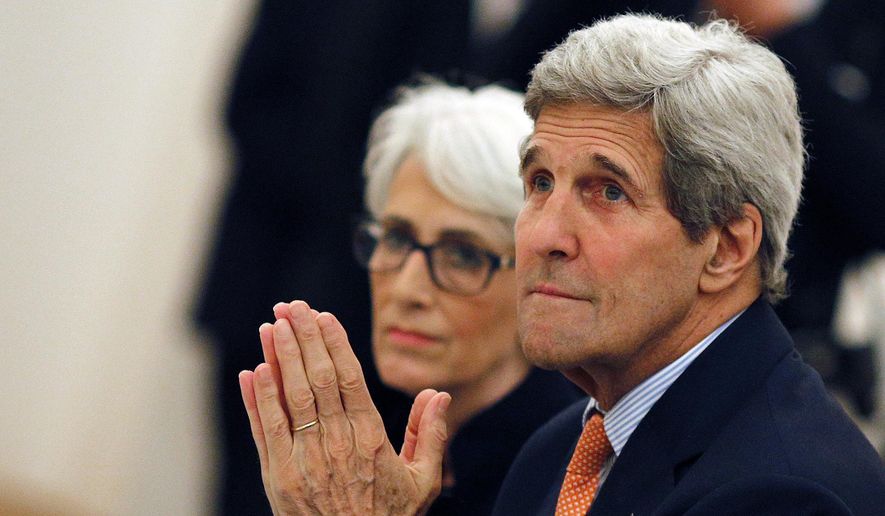The Iran nuclear negotiations blew past their second self-imposed deadline in a week Tuesday, as the Obama administration and its allies in the talks refused a last-minute Iranian and Russian demand for the U.N. embargo on certain arms purchases by Tehran to be lifted as part of sanctions relief the Islamic republic will receive under a final accord.
While the top diplomats from Iran, the U.S. and five other world powers agreed to continue talking in Vienna through at least Friday, Obama administration officials expressed frustration that Iranian negotiators have been unwilling to meet the parameters of an April interim agreement that made no explicit reference to lifting the arms embargo.
“The Iranians so far have not yet been able to sign on the dotted line on a final agreement that reflects the broad frameworks that were established back in April,” said White House press secretary Josh Earnest, who asserted that President Obama “will not accept any sort of an agreement that falls short of the political commitments that were made back in April.”
But Mr. Earnest also said the current round of negotiations between Iran and the P5+1 — the U.S., Britain, France, China, Russia and Germany — are worth continuing “at least for now.”
The talks, which enter their 11th consecutive day Wednesday, are being held behind closed doors, making it nearly impossible to know for sure what is preventing a breakthrough to a final deal.
Officials directly involved, including one from Iran, have told reporters on condition of anonymity that the 2007 U.N. arms embargo on Iran has become a major sticking point.
SEE ALSO: John McCain: Obama’s stance on Islamic State and Iran a ‘delusion’
Publicly, however, the officials have mainly stuck to platitudes.
Federica Mogherini, the European Union’s foreign policy chief, said Tuesday that negotiators “knew it would have been difficult, challenging and sometimes hard” to reach a final accord and that talks will continue despite hitting some “tense” moments.
Other negotiators spoke broadly about deep differences remaining, and there was no public indication they had resolved disputes ranging from inspection rules on suspicious Iranian sites to limits on Tehran’s research and development of advanced nuclear technology.
Russian Foreign Minister Sergey Lavrov told reporters “there is only one big problem in terms of sanctions — it is the problem of a weapons embargo.”
According to the Russian news agency Interfax, Mr. Lavrov said there is “every reason” to believe a deal will still be done within “a few days,” and that there is an “understanding” that most of the current sanctions against Iran would be lifted.
What remains unclear is how the U.S. and its Western European allies in the P5+1 plan to work through the problem if Iran continues to dig in its heels.
SEE ALSO: Former prison guard extradited to Bosnia, charged with war crimes
For Secretary of State John F. Kerry and his team, pressure is increasing from skeptical U.S. allies and members of Congress. If a final accord isn’t sent to American lawmakers by Thursday, their monthlong review period would be doubled to 60 days, hampering the ability of the Obama administration to offer speedy economic benefits to Iran for nuclear concessions.
But the Republican chairman of the House Committee on Foreign Affairs asserted that there is no push from Congress to conclude the negotiations in the next few days.
“The only one pushing to get this done quickly — and reduce congressional scrutiny — is the Obama administration,” said Rep. Ed Royce of California. “If the administration negotiates a sound agreement, it should be able to withstand congressional scrutiny for 30, 60, or even 90 or 120 days. What is the rush?”
Diplomats initially agreed to try to reach a final accord by June 30, but extended their discussions by a week when they missed the goal.
At the Department of State on Tuesday, officials acknowledged that, in order to keep the talks alive, the Obama administration and its partners have extended until at least Friday the “temporary sanctions relief” that Iran already was granted when negotiations got underway last year.
Iran has long insisted that its nuclear program is for peaceful, civilian purposes such as power generation. But the U.S. and its European allies have accused Tehran for more than a decade of secretly trying to develop nuclear weapons in violation of U.N. regulations.
Some assert the Iranians are playing hardball down to the wire in the nuclear talks because they believe the Obama administration is so deeply invested in the pursuit of a deal that U.S. negotiators simply cannot afford to walk away.
One Iranian political analyst promoted an alternative view Tuesday, saying in an interview with Iran’s government-run Fars news agency that “Obama needs negotiations with Iran” because of the Islamic republic’s growing power in the chaotic Middle East.
“The Americans know that they need the agreement more than Iran,” said Seyed Mohammad Marandi, a political analyst at Tehran University. “The crisis in the EU and the region, the region’s collapse by Wahhabism, and the rise of China and Russia are all actually happening for Iran’s leadership and might in the region.”
“These conditions strengthen Iran’s position at the negotiating table,” he said.
⦁ This article is based in part on wire service reports.
• Dave Boyer can be reached at dboyer@washingtontimes.com.
• Guy Taylor can be reached at gtaylor@washingtontimes.com.




Please read our comment policy before commenting.